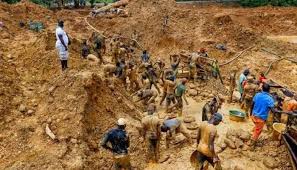The House of Representatives Committee on Solid Minerals has urged a review of the mining consent process within host communities, responding to rising complaints about consent issues in these areas.

Led by Chairman Hon. Jonathan Gaza, the committee made this call during a working visit to the Nigerian Mining Cadastre Office (MCO) headquarters in Abuja on Tuesday. The committee stressed that poorly managed consent agreements could lead to conflicts that risk destabilising local communities. Lawmakers also pledged to secure increased budgetary allocations for the MCO to enhance its operations, noting that similar agencies in countries like Ghana retain a portion of generated revenue, which enables smoother functioning. They suggested that a similar arrangement for the MCO could be explored in Nigeria’s constitutional review.
The committee also expressed concern over the risk of corruption among MCO staff if sufficient incentives are not provided. They advocated for improved working conditions and stronger oversight measures within the MCO to encourage productivity and transparency.
Dissatisfied with the current regional office structure, the committee proposed appointing dedicated desk officers in each Nigerian state to verify consent agreements. They advised that these officers work closely with local land departments to reduce the potential for conflict within mining communities.
Hon. Gaza highlighted the pressing need for reform in the licensing process, saying, “The issue of consent in your licensing process requires urgent attention. We receive numerous complaints related to consent, and I request that you review this aspect carefully. If not well managed, consent issues can disrupt law and order, and we have already seen cases of this happening in certain areas.”
He also warned of opportunities for malpractice among staff, adding, “I am surprised by the high number of licences issued despite the persistent issue of illegal mining.”
In response, MCO Director-General Obadiah Simon Nkom credited recent revenue increases to greater transparency, enforcement, and digitalisation efforts that have streamlined licensing and revenue collection. He emphasised the MCO’s cooperation with anti-corruption bodies such as NEITI, NFIU, and EFCC to prevent misconduct in mineral title administration.
Nkom shared current figures, reporting that since January 2023, the MCO has processed 12,659 new mineral title applications. Recent technological upgrades have allowed almost half of these applications to be submitted online through the MCO’s eMC+ system, a digital platform launched in 2022 for real-time mineral title management. Nkom explained, “Our latest innovation, the web-based eMC+ system, supports efficient and transparent administration of mineral titles throughout their lifecycle.”
Since its introduction to stakeholders in November 2022, the eMC+ system has enhanced transparency, efficiency, and accessibility within the mining sector. By September 2024, the MCO had received 14,171 applications, with 41.06 percent submitted online by stakeholders.
The House committee announced further discussions with MCO officials for next week and an oversight visit to MCO’s zonal offices in the first quarter of the coming year.

